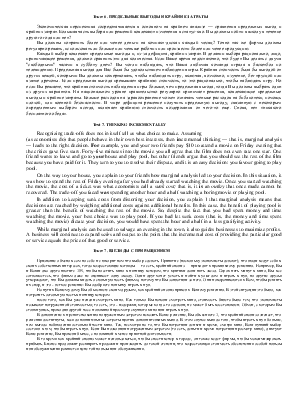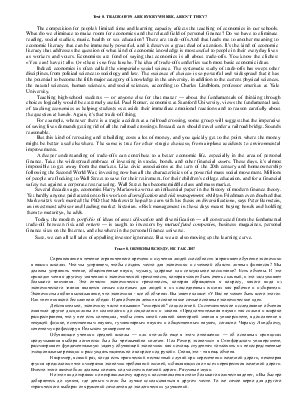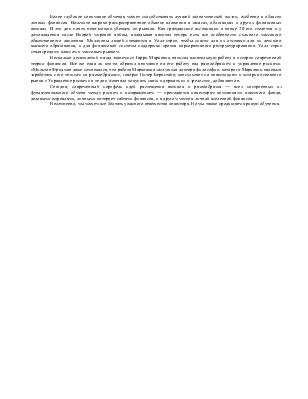




Text 5. RATIONAL BEHAVIOUR
Economics is grounded on the assumption of «rational self-interest». That is, individuals make rational decisions to achieve the greatest satisfaction or the maximum fulfillment of their goals. For instance, they spend their incomes to get the greatest benefit from the goods and services they can afford.
Rational behaviour means that different people will make different choices
because their preferences, circumstances, and available information differ. You may have decided that it is in your best interest to attend college before entering the full-time labour force, while a high school classmate has chosen to forgo additional
schooling and go to work. Why the different choices? Your academic abilities, along with your family's income, may be greater than your classmate's. You may also know that college-educated workers have better job opportunities and lower unemployment rates than less educated workers. Hence, you opted for college, while your former classmate — the one with less academic ability, less money, and less information — chose a job. Both choices reflect the pursuit of self-interest and are rational, but they are based on differing circumstances and information.
Of course, rational decisions may change as circumstances change. Suppose the government decided it were in the national interest to increase the supply of college-educated workers. It was high time it offered two years of «free» community college to all low-income students. Under these new conditions, your high school classmate might now opt for college rather than a job. It is important to remember that rational self-interest is not the same as selfishness. People make personal sacrifices to help family members or friends, and they contribute to charities because they derive pleasure from doing so. Parents help pay for their children's education for the same reason. These self-interested, but unselfish, acts help maximize the givers' satisfaction as much as any personal purchase of goods or services.
Текст 5. РАЦИОНАЛЬНОЕ ПОВЕДЕНИЕ
Экономика основана на предположении о «рациональном личном интересе». Таким образом, люди принимают рациональные решения достигнуть самого большого удовлетворения или максимального выполнения их целей. Например, они тратят свои доходы, чтобы извлечь самую большую пользу из товаров и услуг, которые они могут предоставить.
Рациональное поведение означает, что различные люди сделают различный выбор потому что их предпочтение, обстоятельства и доступная информация отличаются. Вы, возможно, решили, что это находится в Ваших интересах ходить в школу прежде, чем войти в полностью занятую рабочую силу, в то время как одноклассник средней школы принял решение воздержаться дополнительный обучение и идет в работу. Почему различный выбор? Ваши академические способности, наряду с доходом Вашей семьи, могут быть больше, чем Ваш одноклассник. Вы можете также знать, что у образованных колледжем рабочих есть лучшие вакансии и более низкие показатели безработицы, чем менее образованные рабочие. Следовательно, Вы выбрали колледж, в то время как Ваш бывший одноклассник — тот с меньшей академической способностью, меньшим количеством денег и меньшей информацией — выбрал работу. Оба выбора отражает преследование личного интереса и рационален, но они основаны на отличающихся обстоятельствах и информации.
Конечно, рациональные решения могут измениться, как обстоятельства изменяются. Предположим, что правительство решило, что это было в национальном интересе увеличить поставку образованных колледжем рабочих. Это было пора, это предложило два года "свободного" сообщества колледж всем студентам с низким доходом. При этих новых условиях Ваш одноклассник средней школы мог бы теперь выбрать колледж, а не работу. Важно помнить, что рациональный личный интерес не то же самое как эгоизм.
Люди приносят личные жертвы, чтобы помочь членам семьи или друзьям и им способствуют благотворительные учреждения, потому что они получают удовольствие от своих дел. Родители помогают плате за свое детское образование по той же самой причине. Они корыстные, но бескорыстные, действия помогают максимизировать удовлетворение дающих так же как любая личная покупка товаров или услуг.
Text 6. MARGINAL BENEFITS AND MARGINAL COSTS
The economic perspective focuses largely on marginal analysis — comparisons of marginal benefits and marginal costs. Most choices or decisions involve changes in the status quo. Should you go to school for another year or not? Should you spend more or less money on compact discs each month? Similarly, businesses must regularly decide whether to employ more or fewer workers or to produce more or less output.
Уважаемый посетитель!
Чтобы распечатать файл, скачайте его (в формате Word).
Ссылка на скачивание - внизу страницы.